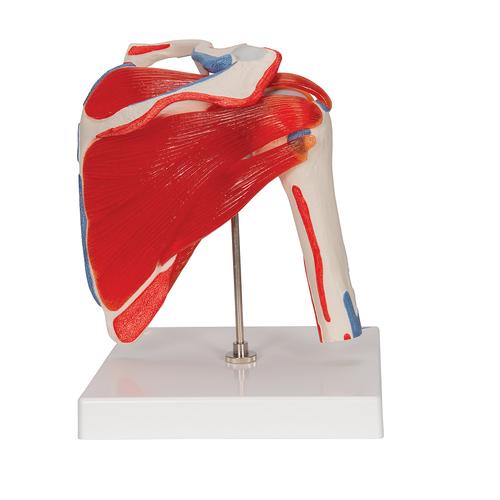Tweet
A great friend of mine has just had his shoulder replaced because of advanced arthritis to the affected joint. He's a very tough guy, but even he tells me that he's had a very painful post op period. But then that's one of the downsides to shoulder surgery - pain with a capital P - and why is shoulder surgery so painful? One of the reasons maybe that we don't realize how much we use the shoulder to brace the arm when we use our hands, and just turning over in bed at night can be like having a branding iron thrust into the affected shoulder. The good news is that it eventually goes away and you will have a much better functioning shoulder: the not so good news is that it can take up to 6 months to get there!
So why am I sounding negative all of a sudden? Well I'm not really because the focus of treatment should always begin with prevention, and we can do a great deal to reduce the chances of suffering from advanced arthritis of the shoulder.
Firstly posture: most of the work we do each day is "in front of us" which means that the "front muscles" tend to be pretty toned up - think those buffed pectoral muscles. But the ones behind us, between the shoulder blades, tend to get stretched and become weaker, with the result that a great number of people have "Hunched" shoulders, and hunched shoulders mean that the bio-mechanics of the shoulder-moving-muscles become inefficient.
A group of these muscles are known as the Rotator Cuff muscles, and they are four in number, and each of them is attached to the shoulder blade (scapular) at one end. At their other end, their tendons blend with the tough lining that attaches the upper arm (humerus) to the scapular and which is known as the Capsule of the Shoulder joint. When we are young and active we can often damaged these tendons/capsule at sport - swimming, baseball, contact sports etc - and once we go past 40 we can also get a build up of calcium in these damaged tendons/capsule, all of which can lead to inflammation, tendon tears and arthritis.
To reduce the chances of this happening:
1. Maintain good posture - imagine that someone has placed a finger on the crown of your head and you have to gently push up against it. This straightens the spine, pushes out the chest and the shoulders naturally fall back allowing the muscles to act more efficiently.
2. Keep good tone in all your shoulder girdle muscles: there are online physiotherapy sites for these exercises, but my recommendation is always to see your own physical therapist for a personal assessment and individual programs - believe me it's worth it!
3. If you suffer an injury or pain in the shoulder get it assessed early. You can start ice/heat and simple pain killers whilst you wait for your appointment, and if you don't have a medical condition which stops you using anti-inflammatory medications, start them as well (if you're not sure, don't take them).
4. Don't move the shoulder in ways that makes it painful: but if you can move it a little bit in a non painful way, then that's OK.
Shoulder surgery is painful, and a full joint replacement or repair does take time: but with proper rehabilitation during recovery, you will be extremely grateful that you had it done. But if you can avoid it by taking good care of your shoulder earlier on in life, you've just freed up 6 months of great living!
image
Ampersands & angle brackets need to be encoded.

1 comment:
I had rotator cuff surgery about 4 years ago. While it wasn't very painful, going thru the therapy was. But, I do have full range of motion back again, so it was worth all the work and going thru the surgery. I can't imagine going thru a shoulder replacement surgery however, - wow - very painful. I try to remember to roll my shoulders a couple of times every day - forward and backward - just to keep those muscles limber. Thank you for the post.
Post a Comment